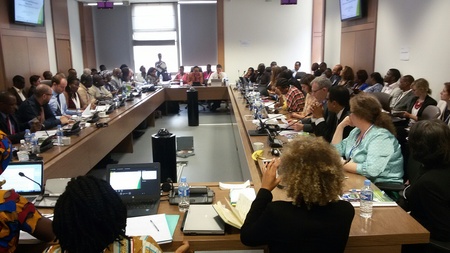On Thursday, February 11, the African Development Bank’s (AfDB) Office of the Special Envoy on Gender (SEOG), in collaboration with the Sustainable Energy for All (SE4All) Africa Hub, the International Network on Gender and Sustainable Energy (ENERGIA) and the ECOWAS Center for Renewable Energy and Energy Efficiency (ECREEE), organized an event that focused on Gender, Energy and Clean Cooking Solutions.
The aim of the event was to raise awareness amongst development partners and African countries that access to clean cooking solutions and renewable energy are critical drivers of gender equality. The Special Envoy on Gender, Geraldine Fraser-Moleketi, emphasized that clean cooking solutions are necessary to achieve global gender equality and energy goals, and can provide significant opportunities for African women’s economic empowerment.
The event offered the opportunity for all participants to discuss best practices and lessons learnt on creating an enabling environment based on the experience of development partners at the (i) policy, (ii) implementation, (iii) supply and (iv) demand level. The scope was to forge new partnerships and to inform the Bank’s work in ensuring the empowering effect of clean energy and entrepreneurship in Bank’s operations – especially for women and girls.
The event featured presentations from ECREEE, the Kenyan Ministry of Energy, the Global Alliance for Clean Cook Stoves, the Global Village Energy Partnership and the World Bank.
As pointed out by the Special Envoy, there are different gender-defined roles in energy production, distribution and utilization in households, communities and the market. The majority of Africans rely on traditional biomass for cooking, this has an impact on day-to-day lives. A recent study found that women spend 3-5 times as much time as men on domestic activities. The same pattern was found in terms of energy collection.
The Special Envoy said that the Bank is committed to “support women with clean cooking stoves – knowing that over 600 thousand people, mostly women and children die from the impacts of indoor pollution, that they walk kilometres and spend hours fetching fuelwood, and then cook with children on their backs, working so hard to feed their families. The New Deal on Energy for Africa will push for the establishment of a Bottom of the Pyramid financing facility. This will form part of a financing facility that is accessible to women. It will be a contribution towards addressing the lack of access to clean cooking solutions for 700 million Africans. We can and must solve their problem – and do so quickly.”
Energy has been placed at the top of the AfDB’s ‘High 5s’ agenda – with a dedicated effort to “Light up and power Africa”. A number of initiatives are underway across the region and the Bank, with its catalytic role, will forge innovative partnerships to assist in integrating gender considerations in energy programs and projects, and scale these efforts across countries.
This post originally appeared on the SE4All Africa website. The agenda and presentations of the meeting can be found here.







